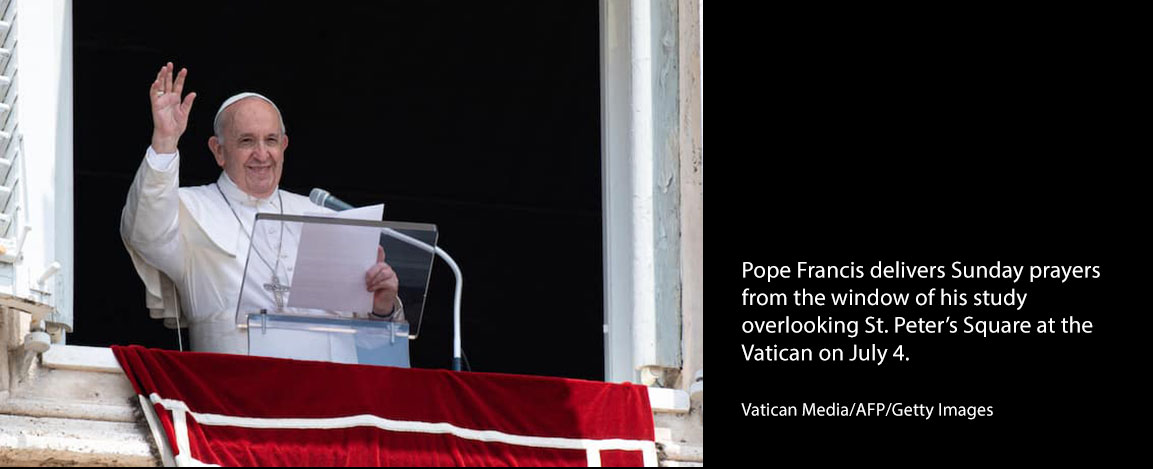Is the pope endorsing the European Union? Emma Campbell-Mohn (@ecampbellmohn), a PhD student in the Department of Political Science and the Security Studies Program, explains in a recent essay in the Washington Post's Monkey Cage.
On June 19, Pope Francis decreed that former French foreign minister Robert Schuman had lived a life of “heroic virtue” and bestowed the title of “Venerable” on him. Proof of “heroic virtue” is a step on the path to sainthood, followed by beatification and sanctification, both of which typically require miracles.
But Schuman’s life’s work did not focus on religion. He is best known for laying the foundations of what became today’s European Union. It’s unusual for a modern politician to receive this kind of recognition from the Catholic Church. What prompted the decision?
Schuman helped create the ancestor of the European Union
After World War II, war-weary European countries sought to cooperate with one another to rebuild their ruined economies, tacitly encouraged by the United States. Schuman played a key role in this, introducing the basis of the European Steel and Coal Community (ECSC) in his “Schuman Declaration.”
Encouraging increased trade and economic cooperation may seem an unlikely qualification for veneration. However, Schuman’s aims went further than economics. He — together with German counterparts — sought to tie Europe’s economies together to create peace in Europe.
On paper, the ECSC had a dry and technical mandate. It was supposed to coordinate Europe’s steel and coal production. Yet Schuman saw this organization as a first step toward European integration, saying, “Europe will not be made all at once, or according to a single plan. It will be built through concrete achievements which first create a de facto solidarity.” Coal and steel were merely part of that vision.
Coal and steel were particularly important because they both played a major role in making weapons of war. That is why the Schuman Declaration states that “solidarity in production [of steel and coal] thus established will make it plain that any war between France and West Germany becomes not merely unthinkable, but materially impossible.”
Scholars disagree over whether economic integration prevents war
There is lively academic debate over the relationship between economic integration and war. Some international relations scholars believe that economic interdependence leads to peace. Others suggest that it makes states more anxious (they do not want to be dependent on other states) and hence more war-prone or does not decrease the likelihood of conflict.
Schuman’s ideas belong firmly to the former camp. He believed that creating a common governance of the means of producing weapons — i.e., the steel and coal industries of both countries — would lead to peace. Rivalry between France and Germany had been a source of political instability during the late-19th and early 20th century, precipitating the Franco-Prussian war and helping cause World War I and World War II. Schuman’s bet was that deeper economic links between France and Germany would remove their reason to fight.
The ECSC achieved greater security through economic means
The ECSC’s goal was increased security, but its actual text focused on economics. In regard to steel and coal, it was supposed to abolish most tariffs between states, dismantle the cartels and break up monopolistic entities. The ECSC created an international governing body to integrate the steel and coal industries of France, West Germany and the other signatories. The governing body included a “High Authority” to coordinate steel and coal in the region and a Consultative Committee, a Common Assembly, a Council of Ministers, and a Court of Justice. This provided a template for the creation of the European Economic Community, which became the European Community and, eventually, today’s European Union.
Even though these institutions covered only economic relations, they may be seen as increasing security through what Paul Schroeder calls a “pact of restraint.” They allowed the countries involved not only to gain more information about other countries’ activities, but also to exercise a degree of control over elements of their own economies.
The papacy may be endorsing European integration — but only indirectly
Schuman became one of the leaders of European integration, which made war less likely. The papacy is not necessarily saying the ECSC is virtuous. Its declaration of Schuman’s venerability included Schuman’s security-related endeavors. He was involved in the founding of NATO, advocated for the European Defense Community and sought to unify Europe’s security policies. He was also a central figure in French domestic politics.
However, the papacy surely understands that Schuman’s most famous legacy was his declaration, and presumably the pope’s action at least to some degree endorses it.
Schuman’s belief that economic integration can lead to peace takes one side in a central debate in international relations. It led to his proposal to make peace on the European continent by coordinating the steel and coal industries, which in turn shaped Europe as we know it today. Because Schuman wasn’t martyred, he would need at least one accredited miracle to be beatified and two to become a saint. It’s not clear how many of the Catholic faithful pray to him for succor, but even if they don’t receive miraculous relief, the papacy has taken a quiet step toward suggesting its sympathy for the European Union and economic integration as a cornerstone for peace.
Emma Campbell-Mohn (@ecampbellmohn) is a PhD student at MIT focusing the intersection of political economy and security.




